Physical Address
304 North Cardinal St.
Dorchester Center, MA 02124
Physical Address
304 North Cardinal St.
Dorchester Center, MA 02124

Swim shoes are footwear specifically designed for use in and around water. For parents of little ones, a common question arises: Should babies wear swim shoes? Let’s explore the safety considerations and potential benefits of swim shoes for babies.
First and foremost, water safety is crucial for babies and toddlers. Here’s why:
Pool decks, boat decks, and even smooth pool tiles can be slippery, especially when wet. Swim shoes can provide better traction for babies taking their first steps.
Poolside pavement and beach sand can get scorching hot under the sun. Swim shoes can protect your baby’s delicate feet from burns.
Natural bodies of water may have rocks, pebbles, or shells that can be uncomfortable or injure a baby’s feet. Swim shoes can offer some protection.
Remember: Swim shoes are not a substitute for adult supervision. Always keep a close eye on your baby when they are near or in water.
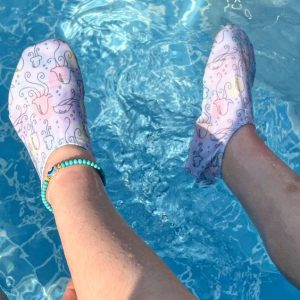
Swim shoes come in a variety of styles and materials. Here’s a quick guide:
Aqua socks: These lightweight, sock-like shoes are made from breathable mesh and offer sun protection and a barefoot feel.
Water sandals: These open-toed sandals provide good traction and allow for quick drying.
Closed-toe water shoes: These offer more protection for the entire foot, including the toes.
The best type of shoe for your baby depends on their age, activity level, and the environment they’ll be in.
Swim shoes can offer some advantages for babies venturing near or into water:
Improved Traction: As mentioned earlier, swim shoes can help prevent slips and falls on wet surfaces.
Sun Protection: Some swim shoes have built-in sun protection for the tops of the feet.
Improved Comfort: Swim shoes can protect your baby’s feet from hot sand, rocks, or other debris.
Confidence in the Water: Some babies may feel more confident taking their first steps in the water while wearing shoes.
It’s important to note: Swim shoes won’t make your baby water-safe. Adult supervision is always necessary.
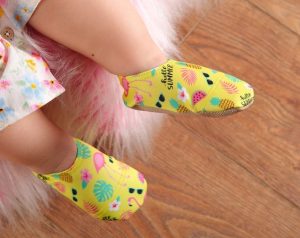
There are also some factors to consider when deciding if swim shoes are right for your baby:
Age and Development: If your baby is not yet walking, swim shoes may not be necessary.
Activity Level: For splashing at the pool’s edge, aqua socks might suffice. For venturing onto rocky beaches, closed-toe shoes might be better.
Comfort: Choose shoes that fit well and are comfortable for your baby to wear.
Water Temperature: In very cold water, swim shoes may not provide enough warmth.
Ultimately, the decision of whether or not to use swim shoes for your baby is a personal one.
If you decide not to use swim shoes, here are some alternatives:
Bare feet: This is perfectly fine for supervised playtime on smooth surfaces.
Water socks: These lightweight socks can provide some grip and sun protection.
Beach sandals: For older babies who walk confidently, sandals can offer some protection on sand.
No matter what you choose, prioritize sun protection and close supervision for your baby near water.
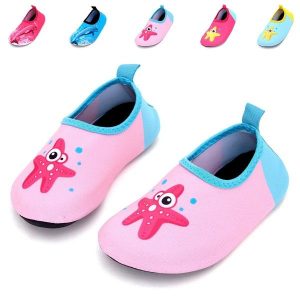
Swim shoes can be a helpful tool for providing some protection and improving traction for babies near or in water. They are not a safety substitute for adult supervision. Consider your baby’s age, activity level, and the environment when deciding if swim shoes are right for them. There are also safe alternatives available.
Always prioritize your baby’s safety and comfort when enjoying water activities together.
Taking your baby to the beach or pool can be a delightful experience. Here are some safety tips to keep in mind for a fun and enjoyable outing:
By following these safety guidelines, you can create a safe and memorable water experience for you and your baby.
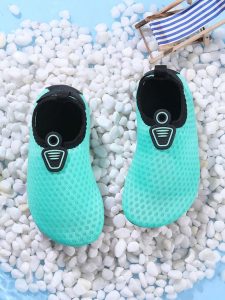
Here are some ideas to make your baby’s water playtime fun and engaging:
Remember, prioritize safety and make bath time the primary place for your baby to get used to being submerged in water.
Swim shoes can be a helpful tool for some babies, but they’re not always necessary. Here’s a summary to help you decide:
Benefits: Swim shoes offer improved traction on slippery surfaces, protect feet from hot sand or sharp objects, and may provide some sun protection.
Considerations: Not all babies need swim shoes, especially if they’re not walking yet. They can also inhibit a baby’s ability to feel the ground and may not provide warmth in cold water.
Alternatives: Bare feet are fine for supervised play on smooth surfaces. Water socks or sandals can offer some grip and sun protection for older babies.
Remember: The most important factor is keeping your baby safe. Here are some general water safety tips:
By following these guidelines, you can ensure a fun and safe water experience for you and your baby.
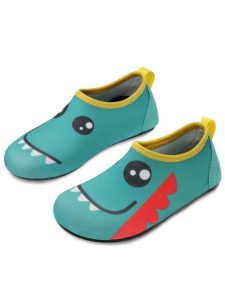
Swim shoes can be an option for providing some protection for your baby’s feet. There are also safe alternatives, and the most important factor is constant adult supervision. Focus on creating a safe and fun water experience for your little one!